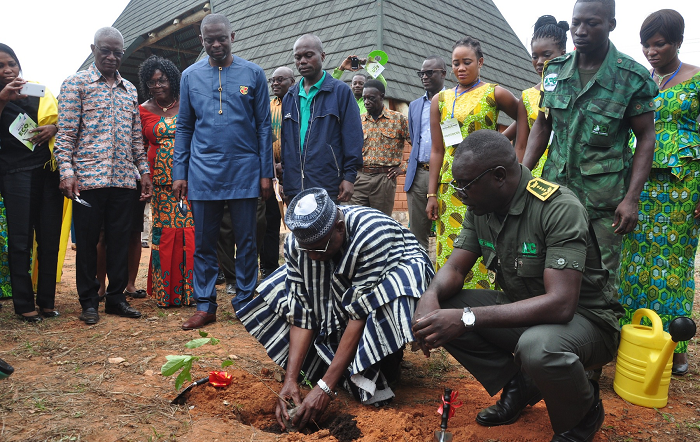
$1.2 billion Accra Eco-Park Project takes off
The sod was cut yesterday for the construction of the $1.2 billion ecotourism project in Accra by the Forestry Commission and its private partner, Aikan Capital Limited. That followed the settling of the legal tussle that threatened the project.
Scheduled to be completed between five and seven years, it is expected to dramatically improve the Achimota Forest, curtailing encroachment and eliminating the domestic and industrial waste dumped inside it.
The first phase of the Accra Eco-Park Project, the city’s only green belt, will be completed in 24 months. It will add to the country’s major national parks—Kakum in the Central Region and Mole in the Northern Region.
The lease agreement allows Aikan Capital to design, build and operate the facility for 10 years.
Features
The project involves the construction of amusement parks, orchards, arboretum, wildlife safaris, museums, eco-commercial enclaves and eco-lodges but with little disruption in the natural vegetation as possible. It will also have a spiritual enclave to cater for spiritual/worship activities that bring more than 180,000 people annually to the Achimota Forest.
Apart from the recreational facilities, the development partners have plans for conference rooms with high seating capacities targeted at corporate bodies. They will be sited outside the main forest area.
Development of the project should have started earlier in the year but had to be put on hold because of a legal action in which four Ghanaians went to court insisting that the deal would harm the environment and pose health and other risks to residents of Accra.
But President John Dramani Mahama, in a speech read on his behalf, said the case had been “settled amicably and the project is back on track”.
Achimota Forest Reserve
The Achimota Forest Reserve was gazetted (as a forest reserve) in 1939 with objectives including serving as a field laboratory research for schools in Accra, providing a place for recreation, conserving biological diversity, as well as playing the ecological role of purifying the air in the city.
However, years of unbridled encroachment has reduced the size of the forest from its original 495 hectares to 355 hectares and portions turned into waste disposal sites.
President Mahama said rather than allow further encroachment and dumping of waste into the forest, the government decided to convert it into a world-class recreational facility and a major tourism destination in West Africa.
![]()
“This development will preserve the only green belt in Accra, and allow the forest to continue to function as a carbon sink and clean the air and at the same time create jobs and business opportunities for the private sector,” he added.
Economic impact
With the Nairobi National Park in Kenya as reference, the Minister of Lands and Natural Resources, Nii Osah Mills, stated that the Achimota Forest Reserve had long been recognised as having outstanding potential for tourism development, considering its location in the city.
The Nairobi National Park generates $8 million in revenue annually.
“The Accra Eco-Park development has, therefore, been conceived to provide a unique opportunity to demonstrate to the business community and the public that ecotourism is a viable, environmentally friendly, employment-creating, sustainable income-generating venture,” he stated.
According to the Forestry Commission projections, the project would create about 4,000 jobs during the construction phase and 2,000 direct and 10,000 indirect jobs when it begins to function.
One million trees
The Chief Executive of the commission, Mr Samuel Afari Dartey, for his part, said the paradigm shift from the over-reliance on timber resources would create opportunities for the private sector, jobs for thousands of unemployed young people and revenue for the government.
The Chief Executive Officer of Aikan Capital Limited, Mr Oheneba Otchere, told the Daily Graphic that the project would ensure that at least one million trees were planted to further strengthen the forest cover.
